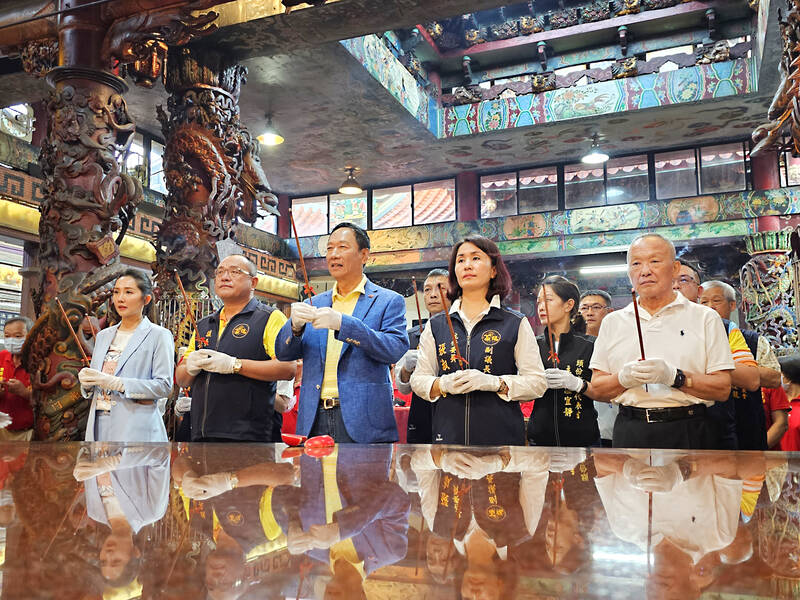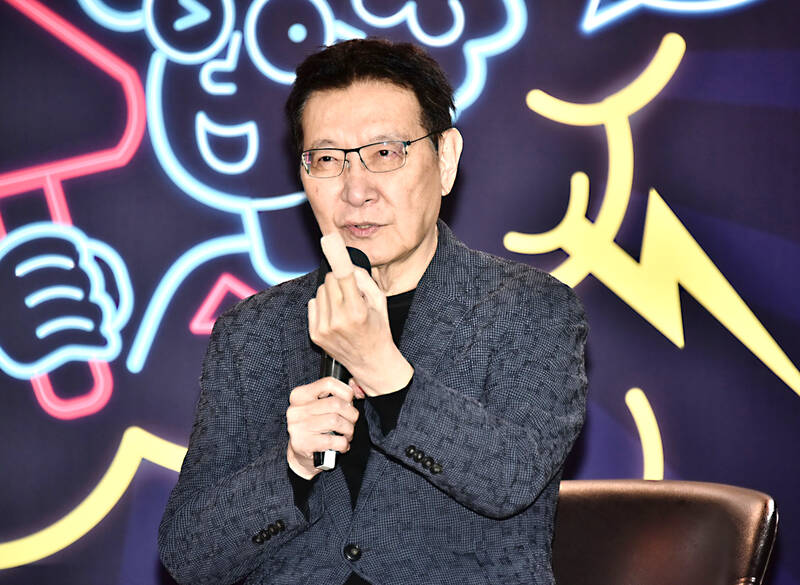One way people in Taiwan can control how they are represented is through their choice of name. Culturally, it is not uncommon for people to choose their own names and change their identification cards and passports to reflect the change, though only recently was the right to use Indigenous names written using letters allowed.
Reasons for changing a person’s name can vary widely, from wanting to sound more literary, to changing a poor choice made by their parents or, as 331 people did in March of 2021, to get free sushi by legally changing their name to include the two characters for “salmon.”
Taiwanese have the right to change their names up to three times, a legal restriction some of those “salmon” people were unaware of, leaving them stuck with names like “Salmon Dream” and “Dancing Salmon.”

Photo: Peng Chien-li, Taipei Times
It is also not uncommon to choose English and Japanese names as well, though many have little need for them and simply default to the names assigned in school or the mangled Wade-Giles romanizations used by default in Taiwanese passports.
Mid-level leaders in politics and above give thought to their English names because their names will be recorded in English versions of government documents and in the English news. Often, their choices can tell us something about them.
MADE IN CHINA

Photo: Chen Yi-chuan, Liberty Times
The first person to take up residence in Taiwan with worldwide recognition was former president Chiang Kai-shek (蔣介石). He changed his Chinese name many times, and this was not even the last name he gave himself, but it was the name he was using when he came to the attention of the West.
The “Kai-shek” romanization is Cantonese, a language he did not speak. Three possible reasons come to mind as to why. One is that he ran the Whampoa military academy in Canton (Guangzhou). Another is the proximity of British Hong Kong; he may have done so out of habit because Cantonese was the Chinese language spoken there.
A third possibility was to imitate his then-boss Sun Yat-sen (孫逸仙), who used Cantonese to romanize his name. Chiang’s final name Chiang Chung-cheng (蔣中正) was clearly chosen to resemble another name adopted by Sun, Sun Chung-shan, (孫中山).

Photo courtesy of Lin High-Priced Salmon
All of the Zhongshan/Jhongshan and Zhongzheng/Jhongjheng roads and districts are named after those latter two names. Chiang’s active courting of Sun went so far as to marry Soong Mei-ling (宋美齡), the sister of Sun’s wife.
Soong is not a standard romanization, but is a good one. A native speaker of English would likely pronounce this spelling closer to the original surname than the standard romanizations of Song or Sung.
Though unrelated, James Soong (宋楚瑜) — effectively the “People” in the People First Party with a penchant for running for president — also chose this spelling.
One added element that used to be common, but seems to be disappearing now, is an extra “r,” which may have been a nod to Beijing-style “proper” Mandarin that uses a lot more of that sound than Taiwanese do. The only top politician still using this is the longest-serving lawmaker, Democratic Progressive Party (DPP) caucus convener Ker Chien-ming (柯建銘), who was elected in 1992 when the added “r” was a lot more common.
When people use China’s Hanyu Pinyin system to romanize their names, that is usually an indication they are politically deep blue. Look for the Zh, Z, X and Qs that system uses, though only at the front; sometimes Zs will be used in Taiwan in the middle of names like Tzu.
Miaoli County Commissioner Zhong Dongjin (鍾東錦), a convicted felon, is one and former Yilan County commissioner Lin Zi-miao (林姿妙), also a felon, is another — though she adds a Wade-Giles hyphen.
QUIRKY SPELLERS
Taiwan has had two former presidents in this category, Ma Ying-jeou (馬英九) and Tsai Ing-wen (蔡英文). Both names have the same ying (英) character, but spell them differently.
At birth both had been assigned different characters, but they were changed later which left Tsai with the curious situation that her given name is the same as the word for “English language,” yingwen (英文). Ma’s name has the character for “nine,” jiu (九), which his deeply pro-Chinese unification father chose to reference ancient China’s nine divisions and the desire to unite the nation.
The former legislative speaker’s name is now You Si-Kun, but previously went by Yu Shyi-kun, as he recently confirmed to me.
In most cases these quirky spellers are trying to spell the name closer to how it sounds in English because modified Wade-Giles used in passports is wonky. In some cases this is effective, such as with DPP lawmaker Huang Jie (黃捷) and Taichung Mayor Lu Shiow-yen (盧秀燕).
In other cases, the quirky spelling makes it worse, such as with Hon Hai Precision Industry Co (aka Foxconn) founder and former presidential candidate Terry Gou (郭台銘), whose surname would have been spelled Kuo on his passport. Changing to the G from K made sense, but his name is pronounced Guo not Gou. Gou in Mandarin sounds like “dog,” which would have been embarrassing as president had he won.
My favorite quirky speller is former Chinese Nationalist Party (KMT) vice presidential candidate Jaw Shaw-kong (趙少康), who I strongly suspect is using pseudo-Cantonese style spellings for his Mandarin name because he was a fan of Hong Kong movies growing up.
A common change is from E to O, such as with Taiwan People’s Party (TPP) founder Ko Wen-je (柯文哲) and the once and likely future KMT candidate for Kaohsiung mayor Ko Chih-en (柯志恩).
Though no politicians come to mind with an obviously Tongyong Pinyin romanized name, I have met people who use it, and all are pan-green supporters.
CHOSEN NAMES
President William Lai’s (賴清德) name is sometimes written Lai Ching-te, but judging by comments he made last year, he prefers the former to the latter.
Taiwan news outlets vary widely and are all inconsistent in using the names that the people themselves chose.
For example, Legislative Speaker Han Kuo-yu (韓國瑜) very consistently made it clear he wants to be known by Daniel, and with his wife for years ran a bilingual school in Yunlin County. For reasons unknown, I am the only one who uses it, everyone else uses Kuo-yu.
Incidentally, the first two characters in Han’s name spell out Korea and the third character is a homonym with fish, hence his nickname “Korea fish.”
Chosen names are not always English, but are used as such. Cosplaying former lawmaker Souichi Lai (賴品妤) appears to have mysteriously named herself after a Japanese manga anti-hero known for “his schemes, though many of them backfire in comedic and ironic ways.”
Former lawmaker Pasuya Yao (姚文智) picked a Taiwanese Indigenous Tsou name, though he is not himself Tsou. An interesting case is TPP lawmaker Jenny Maiyu (麥玉珍, Mach Ngoc Tran), who is from Vietnam but uses the English Jenny and Mandarin Maiyu in all of her social media accounts.
Control Yuan President Chen Chu (陳菊) previously went by Kiku and Joyce, but dropped both. Taipei Mayor Chiang Wan-an (蔣萬安) previously went by Wayne, but he told me he no longer uses it.
Sometimes they are humorous, like former Taipei City councilor Chiu Wei-chieh (邱威傑) using the name Froggy (呱吉). Somebody by now must have told former vice premier Woody Duh (杜紫軍) his name is funny.
Donovan’s Deep Dives is a regular column by Courtney Donovan Smith (石東文) who writes in-depth analysis on everything about Taiwan’s political scene and geopolitics. Donovan is also the central Taiwan correspondent at ICRT FM100 Radio News, co-publisher of Compass Magazine, co-founder Taiwan Report (report.tw) and former chair of the Taichung American Chamber of Commerce. Follow him on X: @donovan_smith.

In the March 9 edition of the Taipei Times a piece by Ninon Godefroy ran with the headine “The quiet, gentle rhythm of Taiwan.” It started with the line “Taiwan is a small, humble place. There is no Eiffel Tower, no pyramids — no singular attraction that draws the world’s attention.” I laughed out loud at that. This was out of no disrespect for the author or the piece, which made some interesting analogies and good points about how both Din Tai Fung’s and Taiwan Semiconductor Manufacturing Co’s (TSMC, 台積電) meticulous attention to detail and quality are not quite up to

April 21 to April 27 Hsieh Er’s (謝娥) political fortunes were rising fast after she got out of jail and joined the Chinese Nationalist Party (KMT) in December 1945. Not only did she hold key positions in various committees, she was elected the only woman on the Taipei City Council and headed to Nanjing in 1946 as the sole Taiwanese female representative to the National Constituent Assembly. With the support of first lady Soong May-ling (宋美齡), she started the Taipei Women’s Association and Taiwan Provincial Women’s Association, where she

Chinese Nationalist Party (KMT) Chairman Eric Chu (朱立倫) hatched a bold plan to charge forward and seize the initiative when he held a protest in front of the Taipei City Prosecutors’ Office. Though risky, because illegal, its success would help tackle at least six problems facing both himself and the KMT. What he did not see coming was Taipei Mayor Chiang Wan-an (將萬安) tripping him up out of the gate. In spite of Chu being the most consequential and successful KMT chairman since the early 2010s — arguably saving the party from financial ruin and restoring its electoral viability —

It is one of the more remarkable facts of Taiwan history that it was never occupied or claimed by any of the numerous kingdoms of southern China — Han or otherwise — that lay just across the water from it. None of their brilliant ministers ever discovered that Taiwan was a “core interest” of the state whose annexation was “inevitable.” As Paul Kua notes in an excellent monograph laying out how the Portuguese gave Taiwan the name “Formosa,” the first Europeans to express an interest in occupying Taiwan were the Spanish. Tonio Andrade in his seminal work, How Taiwan Became Chinese,